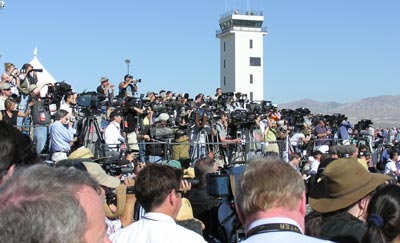The duty and power of space journalistsby Sam Dinkin
|
| Beware of believing that one can be unbiased. As in quantum mechanics, the journalist affects what happens next. |
There are not too many space journalists. Many fewer than the 1,200 in the Science Fiction and Fantasy Writers of America, Inc. If we pooled $20 each, we might only get a thousand or two in dues. But what we lack in cash, we can make up in clout. We influence the public and the decision makers. We help frame the debate over what to do next. People within and outside companies read our publications. Our words can help these people hold wiser beliefs and make wiser decisions. With that sort of clout, we should be able to find a sponsor to help us in our goals.
To that end we are seeking sponsors. Perhaps those sponsors will be willing to do one or more of the following:
- Post higher dollar value awards for the space journalism prize (e.g., $10,000 like the Pulitzer Prize);
- Post awards for additional categories (Pulitzer has 14);
- Pay honoraria for celebrity judges;
- Sponsor a reference web site with space contacts, press kits, links, and research; and
- Sponsor a Space Journalism Association annual meeting.
Other tasks include the following:
- Formalizing the association;
- Electing a board and officers;
- Selecting a committee that will update the award criteria to better meet the needs of journalists, sponsors, and readers;
- Selecting a committee to recruit;
- Selecting a committee to propose services that the association should seek sponsors to provide; and
- Selecting a committee to propose new committees.
Philosophy
Space journalists may view themselves as unbiased observers or industry watchdogs. Beware of believing that one can be unbiased. As in quantum mechanics, the journalist affects what happens next. It is not appropriate to give equal time to terrorists if one does not want to encourage terrorism. Instead of seeking total neutrality, seek a world that you want to live in. Report truth with your recommended interpretation explicitly stated or implied so that readers are able to draw the wisest possible conclusions.
A healthy skepticism is sensible when reporting any story. But realize that it will be more difficult to get another story if the story you publish is negative. The harm to publishing a negative story are concentrated while the harm to publishing an overly positive story are diffuse. Public choice theory suggests that space journalists should be pulled to be somewhat more flattering of their subjects if they ever want to interview them again.
News about bad events is sometimes as dangerous as the bad events themselves. Surely people should know the risks they are undertaking to fly in space. But if the reporting of the first crash is overly negative, it will prevent the high flight rates that will allow safety to improve from experience. If news changes a $1 billion industry to a $100 million dollar industry, it may harm fewer citizens, but it also helps fewer citizens. Journalists should implicitly do a cost benefit analysis about whether the actions they call for (or would be a consequence of their pieces) would ultimately help the most.
In particular, it is fuzzy thinking to treat a human life as absolutely inviolate. That would imply that we should not cross the street or drive a car. It may be a reasonable decision about whether society should try to impose tight safety standards or trust that it is bad business for companies to let their customers get hurt, but to demand zero risk is to demand something impossible. And to get too close to zero risk is increasingly undesirable.
| Space journalists should act as a steward for the millions of readers that want to go to space to protect their chance to fly and not just their “eyeballs” reading your publication. |
The needs of the editor offset the needs of the journalist. The editor cares about circulation. Often the sensational story is the one that is the most unflattering to the subject. If one house falls down in an earthquake, that is where the cameras will be. “Facts in a vacuum” can easily steer readers to the wrong conclusion. If bad news is reported, it should be in context and compared to analogous situations if that accomplishes the right goal. That infant mortality exists at all is terrible (6.8 per 1000 births). The fact that it is lower than 100 years ago is wonderful (140 per 1000 births). Is it better to make people miserable and call them to action or make them happy? If so, the fact in a vacuum may be the right course despite the subtle omission.
If a space journalist wants to report from a suborbital flight, from orbit, from the Moon or Mars, the journalist should take the long view and foster policies, companies, and attitudes that facilitate that future. Space journalists should act as a steward for the millions of readers that want to go to space to protect their chance to fly and not just their “eyeballs” reading your publication.
It was editors like John L. O’Sullivan and Horace Greeley that helped settle the American West. You will be the people who help settle the Moon, Mars and the rest of the solar system. Your wise words and research can increase the chance that the human species will be eternal.
